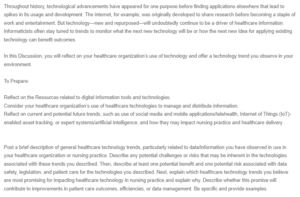Peer Response – Healthcare Information Technology Trends
Response 1
Hello,
This is an excellent post. I agree with you. Healthcare-targeted advanced technologies can potentially advance healthcare regarding affordability, accessibility, and outcomes. Currently, technologies such as EHRs, mobile health apps, and wearables, among other digital technologies, have already proven to increase efficiency in healthcare delivery (Kasoju et al., 2023). Other advancements in the medical sector, such as vaccine technologies, have enabled humans to manage and treat complex health problems throughout history. Notably, all these technologies rely on data and information. Besides the benefits, the reliance on user data creates concerns over the privacy and safety of the users’ data (Bani Issa et al., 2020). As you have noted, new devices and fitness technology companies have access to user data and provide access to such data to other users, such as healthcare providers. Although beneficial to improving healthcare delivery and outcomes on many levels, this creates a risk of unauthorized parties accessing such data.
References
Bani Issa, W., Al Akour, I., Ibrahim, A., Almarzouqi, A., Abbas, S., Hisham, F., & Griffiths, J. (2020). Privacy, confidentiality, security and patient safety concerns about electronic health records. International Nursing Review, 67(2), 218–230. https://doi.org/10.1111/INR.12585
Kasoju, N., Remya, N. S., Sasi, R., Sujesh, S., Soman, Biju, Kesavadas, C., Muraleedharan, C. V., Harikrishna Varma, P. R., & Sanjay Behari. (2023). Digital health: Trends, opportunities and challenges in medical devices, pharma and bio-technology. CSI Transactions on ICT 2023 11:1, 11(1), 11–30. https://doi.org/10.1007/S40012-023-00380-3
Response 2
Hello,
Agreeably, despite the potential benefits of incorporating advanced medical and healthcare technologies in practice, many healthcare facilities, including clinics and practitioners, are not ready to adopt such technologies. These healthcare technologies, such as telehealth services, have evidently improved how healthcare services are delivered and accessed with notable outcomes such as better patient health literacy and self-care, better quality of life, and significant reduction in the risk of hospital readmissions (Wong et al., 2022). Arguably, these digital systems in healthcare delivery, including in the medication process, such as barcode-aided administration systems and automated dispensing systems, have significantly reduced the risk of medication errors and adverse drug events (Zheng et al., 2021). However, of concern is the dependency on technologies to perform the roles of humans. According to Grissinger (2019), there is a risk of overreliance on these advanced healthcare technologies and the development of automation bias. Consequently, automation bias creates the inability to cognitively analyze presented data from a human perspective or accept opposing views in decision-making.
References
Grissinger, M. (2019). Understanding human over-reliance on technology – PMC. P&T, 44(6), 320–321. https://www.ncbi.nlm.nih.gov/pmc/articles/PMC6534180/pdf/ptj4406320.pdf
Wong, A. K. C., Bayuo, J., Wong, F. K. Y., Yuen, W. S., Lee, A. Y. L., Chang, P. K., & Lai, J. T. C. (2022). Effects of a nurse-led telehealth self-care promotion program on the quality of life of community-dwelling older adults: Systematic review and meta-analysis. In Journal of Medical Internet Research (Vol. 24, Issue 3). https://doi.org/10.2196/31912
Zheng, W. Y., Lichtner, V., Van Dort, B. A., & Baysari, M. T. (2021). The impact of introducing automated dispensing cabinets, barcode medication administration, and closed-loop electronic medication management systems on work processes and safety of controlled medications in hospitals: A systematic review. Research in Social and Administrative Pharmacy, 17(5), 832–841. https://doi.org/10.1016/J.SAPHARM.2020.08.001
ORDER A PLAGIARISM-FREE PAPER HERE
We’ll write everything from scratch
Question

Healthcare Information Technology Trends
Throughout history, technological advancements have appeared for one purpose before finding applications elsewhere that lead to spikes in its usage and development. The internet, for example, was originally developed to share research before becoming a staple of work and entertainment. But technology—new and repurposed—will undoubtedly continue to be a driver of healthcare information. Informaticists often stay tuned to trends to monitor what the next new technology will be or how the next new idea for applying existing technology can benefit outcomes.
In this Discussion, you will reflect on your healthcare organization’s use of technology and offer a technology trend you observe in your environment.
To Prepare:
Reflect on the Resources related to digital information tools and technologies.
Consider your healthcare organization’s use of healthcare technologies to manage and distribute information.
Reflect on current and potential future trends, such as use of social media and mobile applications/telehealth, Internet of Things (IoT)-enabled asset tracking, or expert systems/artificial intelligence, and how they may impact nursing practice and healthcare delivery.
Post a brief description of general healthcare technology trends, particularly related to data/information you have observed in use in your healthcare organization or nursing practice. Describe any potential challenges or risks that may be inherent in the technologies associated with these trends you described. Then, describe at least one potential benefit and one potential risk associated with data safety, legislation, and patient care for the technologies you described. Next, explain which healthcare technology trends you believe are most promising for impacting healthcare technology in nursing practice and explain why. Describe whether this promise will contribute to improvements in patient care outcomes, efficiencies, or data management. Be specific and provide examples.
BY DAY 6 OF WEEK 6
Respond to at least two of your colleagues* on two different days, offering additional/alternative ideas regarding opportunities and risks related to the observations shared.

